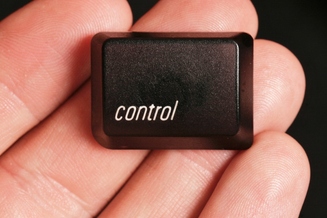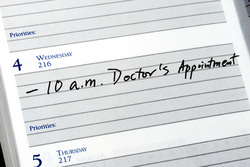 My chaplaincy was spent at a “trauma 1” center. I watched summer nights yield knife fights and gunfire. I caught a burly, tatoo'ed man in my arms as his wife was wheeled into the ER. She lost control of her motorcycle while trying to avoid a truck. I sat with a widow whose husband fell off a ladder affixing Christmas lights. The definition of trauma is any situation or event that distresses or disrupts. In other words, if we are traveling one way and something stops us in our tracks – that's trauma. I hit someone; I stop them from whatever they were doing – that's trauma. Trauma doesn't necessarily have to be a damaging physical event but usually our physical bodies are involved. But the trauma that continues to inform much of my understanding of our ability to control life happened when two teenagers made a suicide pact. My beeper went off – Code 40, Trauma, 5 minutes by ambulance. One boy, dead on arrival. I never saw him or his family. But his friends were surrounded by dozens of hands, each in control of one portion of this young man's treatment. The chaplain reports to a trauma call. I typically stood right outside the room and the door was often left open. I held the space as sacred – I whispered prayers. I watched; I breathed. In a frenzy of doing everything within our power, I represented what is beyond our power.  I wasn't alone outside the room. Other physicians waited their turn, patient advocates looked for contact information while security guards cataloged the patient's belongings. The guard found a note, began reading it and looked up – his eyes searched for me. “Are you the chaplain?” “mh hm,” shaking my head. He handed me the paper. I began to read a scratched out note that laid clear intentions of a suicide pact. I took a deep breath,looked up from the note to find four physicians standing over my shoulders reading the note. I touched them lightly on the shoulder, the arm, “Hey, you ok?” At first they didn't say anything. They didn't want to look at me. As the chaplain, I represent all of the things that are out of their control. Again doctors and nurses are trained to do everything in their power to heal. My presence reminds them that not everything is within our power. And when trauma happens, we find so little within our control. I tried to get their attention again, “Seriously, everyone, how are we doing?” One finally spoke, “It pisses me off.” Another spoke up, “Stupid kid, he writes the damn note and he survives while his friend dies. What's he gonna do now?” “He wanted to die. Look at all that's going on to save him right now.” Our eyes glanced up to see all of those hands working diligently in the trauma room. Before you think “doctor's aren't supposed to talk like that,” I want to make sure I say I learned about courage and diligence from hospital physicians. I learned to do the job in front of me, with all that I've got until my shift is up. Then I learned to trust your colleagues to take over for you. I learned to take small breaks in between crisis. After talking through frustration and making sure they were heard, I folded the note and handed it back to the officer on duty. With a sad smile, I asked the patient advocate to call me when the young man's parents arrive. I found a seat in the hotel lobby where there is a water fountain and a gas fireplace. I caught my breath and tried to imagine this family's next 48 hours. I whispered prayers and cultivated a spirit of peace and acceptance, preparing myself to look into the eyes of his parents. A couple hours later, after the psychologists and social workers had seen the parents, I knocked on the door, both parents stood beside the bed, a physician checking his vitals. I'm Beth, I was the chaplain on call when your son arrived. “Did you see the note? I nodded. “Did you?” I asked. “Yes.” And after a pause, she said, “We don't understand.” “I imagine you wouldn't.” Tears were dripping on her cheek forming a continual streak her right cheek while her left eye was being blotted with a tissue. After a period of silence together, holding the sacredness of this space,I touched her shoulder and said, “Be kind to yourself.” He was to be moved to a facility soon. I told her that she would remain in my prayers – for strength and wisdom and that she would extend kindness to herself. I packed my stuff and prepared to leave my shift, passing on information to the next chaplain on call. I remember the drive home. It was not quite gray. The sun shone through the wispy clouds here and there. There was a slight breeze. I watched as the world began to wake up – a woman walking on the sidewalk, a guy putting out a rack of shirts at a storefront. When I arrived home, I made coffee and found a place on the couch to stare out the window for awhile. What just happened? A person tried to take his own life; a person was unsuccessful in trying to take his own life. Unlike the majority of the people who enter the emergency room by ambulance, this one didn't want to be saved. He had planned for death. He had tried to take control and failed. It would take me another 3 months to realize that my struggle with this specific instance was about “control” and our lack of it. As a chaplain and as a pastor, I have developed a relationship with the fragility of life, the randomness of illness, the frightening reality of the world around us. But those things happen to us and we have no control. This young man had tried to take control – and even that was out of his control.
1 Comment
 Most people go to the doctor once/year. For those dealing with chronic illnesses, doctors are practically part of our families. Our doctors know our weekly activities; they remember our kid's names. Take for example, our chiropractors... Dr. Mike and Dr. Heidi. I've gone to the chiropractor my whole life, not Pete. In the 2nd year of his diagnosis, he gave it a try. I'll never forget the first adjustment for him – he slept through the night. He couldn't remember the last time that happened. Sleeping for the chronically ill is currency. We assume with MS that his neurons have fired five times in order to make a complete circuit making it possible to do a simple task like move his right leg. Sleep is his friend. Sleep generates more energy. Sleep provides a reboot to his system. A full night of sleep = priceless. He goes to the chiropractor every week. I go every other. As a caregiver, I experience some stress... but still – every other week? Is that necessary? Physically – I'm not sure. Emotionally – without a doubt – completely necessary for me. It's one of the only times during my week where someone else cares for me. They look me in the eye and ask how I'm doing. They touch me, lovingly as a physician and companion on life's journey. They know a portion of my life better than anyone else. And they hold that knowledge in trust. One week, Pete was having a particularly bad week. He stumbled as he entered the waiting room. Dr. Mike took over. He helped Pete up. He got Pete started with treatment and then motioned to me to follow him. We were headed into their back coffee room. Having never been in there, I took in the sights of their personal space – nothing more than a closet really with a coffee maker, some mugs and a place for their stuff. I looked back at Mike and he asked, “How are you?” fully expecting an honest answer from me. I started to say “this kind of thing happens all the time. Pete gets tired. This has been a bad week. And he interrupted me and asked again, “but how are you?” I had been holding back tears probably for three days but here they come – I was determined to at least control the pace they would fall. While I was attempting to control my tears, he told me about his experiences with his dad who has parkinson's. He used words like frustrated, disappointed, exhausted. He asked if I was taking care of myself. While I appreciate this question, I often feel judged by it. If my answer is yes then I suppose that means that whoever asked thinks I look horrible or run down. If my answer is no, it's because I can't find the energy or time and then I feel like a failure. And yet when people ask, I'm am reminded that others think me caring for myself is important. That's nice. Truly. But a better question might be, “How can I offer you care? Not Pete – you?” So Mike asks, “Are you taking care of yourself?” I say, “Yes, I exercise, I do yoga, I read, I write, I cook. I have friends and... I come to the chiropractor.” He smiled and waved me out of the coffee room and into a treatment room saying, “Let's get at that then.” Lying face down on the table, I judiciously allowed my tears to leak out while Mike massaged knots out of my back and straightened me out again. Having cared for me, he grabbed my hands and lifted me back into my life as a caregiver. |
What is this blog about?These are some of the reflections that I am fashioning into a memoir about coming to peace with my husband's diagnosis of multiple sclerosis.
|



